The trend has taken social media by storm in recent years, but what exactly is a bullet journal?
Simply put, a bullet journal (sometimes shortened to BJo or BuJo) can be anything you want it to be - and, for most people, it's an effective life planner. Using coded bullet points or colour keys to mark your progress, you can set goals, plan meals, make to-do lists, track moods and habits, or simply record your thoughts and feelings in a way that's efficient and unique to you.
If you struggle to stay motivated when trying something new, bullet journaling might be a good way to keep your habits on track. Exercise, for example, can be especially hard to keep up, but you might find the NHS Couch to 5K challenge gets you moving week by week.
If you've always admired fitness gurus and flawless bullet journals, now is a great time to start and combine the two! We asked BuJo expert Louise Chai (better known online as Doodlelou) to share a step-by-step guide to create your very own bullet journal. She's given us examples of bullet journal pages to help you plan your exercise and studies.
You will need:
A journal or notebook with dot grid paper (this will make it easier to draw in straight lines and plot points to keep your BuJo neat)
Coloured pens
A writing pen/pencil.
Start your BuJo journey with Couch to 5K
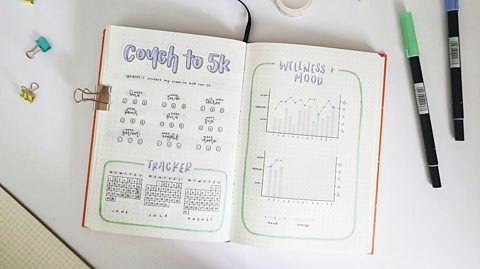
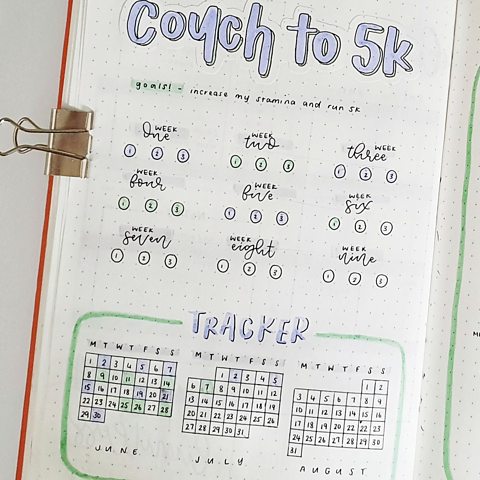
Louise has come up with an example Couch to 5K spread which might encourage you to complete the course:
First, add a small tagline at the top of the page which outlines your Couch to 5K goals, so you can always refer back and remind yourself of what you want to achieve. Pick one or two, and make sure they're realistic! Too many goals or goals that are too ambitious will be harder to stick to
Split the spread into three sections: the session you'll complete per week, the date of your session in the month, and your wellness and mood after the session
Every time you complete a run, fill in each section by marking off with a coloured pen. This 'closing ritual' will signify the end of your work for that day and help you feel rewarded for finishing
Alternate your favourite colours (Louise has chosen purple and green) so you can easily see how far into the course you are. As you mark off each session the page will become more satisfying to look at, and you'll know what each colour means at a glance

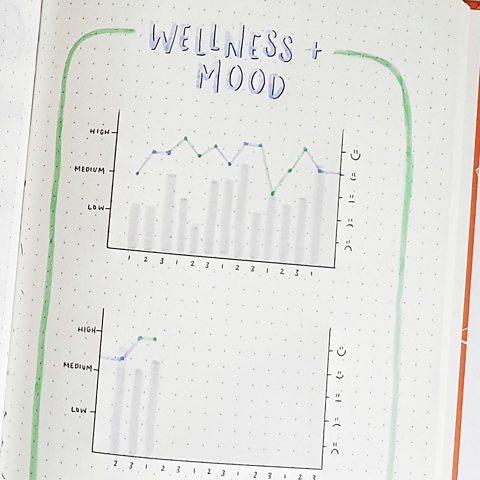
For your wellness and mood tracker, mark the height of your mood along the Y axis and the session number along the X axis. Louise has plotted her mood as a scatter graph, and added a bar chart in a pale purple underneath to record her energy levels after each session
Decorate however you like!
Don't feel disheartened if it looks complicated in the beginning, as you can always start again to figure out what works.
"It can seem tedious at first to set it up, but it's fun to see the page come together as you fill it," says Louise, "and it's a nice reminder of what you've achieved."
Remember that your spread doesn't have to look exactly like this either - it should be unique to you.
"The best thing about using a bullet journal for this is that you have complete creative freedom on what you include," Louise adds. "If you don't want to track the dates, you could create a aspiration vision board."
A vision board is similar to a mood board and is useful for planning your aspirations (hopes). You could draw or paint your aspirations, or build up a collage of words and pictures to help you visualise your goal clearly.
"If you don't need a mood tracker, you could write down your long and short term fitness goals. It can be as detailed or as simple as you need."


What to expect as you build up to your first 5K
You'll walk more than you run in the beginning. You might feel intimidated by the idea of a 5K run, but won't jump straight into athlete-level exercise. The programme will help you build up gradually, starting with short bursts of jogging during your walk
You'll feel achy the day after. A mild aching is normal and a sign you're building stronger muscles. You can reduce Delayed Onset Muscle Soreness (DOMS) by warming up and cooling down properly. Recording this is important, as you'll see how much less you ache as you get better at running
You'll have ups and downs. You might have heard of hitting the 'runner's wall': a sudden feeling of fatigue during training. This isn't a step backwards, but your body's way of telling you to stop and have a snack and a sit down. If that's it for that day, that's okay! Taking a break to recover will help you push through it and come back stronger. Even the pros have bad runs, and seeing your progress laid out in front of you can help you soldier on and stay focussed on your goal
It'll all be worth it! There are many physical and mental benefits to exercise, and you'll start feeling the benefits of getting fitter in no time. Keep going.

Find your focus with a study planner
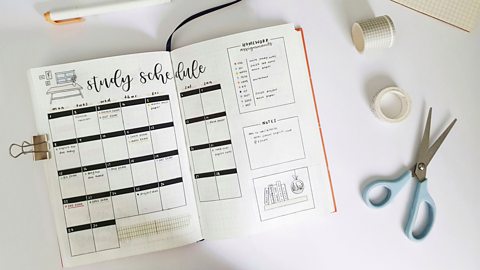
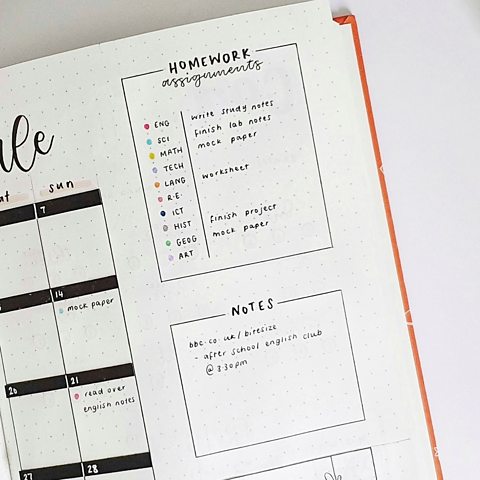
Studying can seem daunting, but planning out your study schedule might help you feel less overwhelmed by it. Planning ahead can be useful to manage your time, be mindful of your deadlines and prepare for any events.
"Personally, I like to see the whole month so I can prepare for upcoming tasks," says Louise. "But this can easily be made into a weekly planner, or even a daily planner to track your work and revision in more detail."
Try her simple study schedule for exams and school work:
Draw out a calendar for the month. Leave plenty of space at the side to add your other sections
Add a section to list the subjects you'll be studying. Give each subject a different colour so you can easily see what's on the agenda without having to read it
Add a section for homework assignments and other notes.
Don't forget to make it fun! Use stickers or doodles to fill in the negative space. Louise says a planner that is pleasing to the eye will be more motivating to fill in:
"I always thought school planners were quite boring so they didn't inspire me to do the work. With a bullet journal, you can add your own doodles or your favourite colours and find a layout that works for you as an individual."

The Couch to 5K number crunch quiz
Test your knowledge of distance, speed and time equations.

How to make the perfect study station at home
Studying at home might seem frustrating at first, but we're here to help.

Can writing be therapeutic?
How getting creative with words can boost your wellbeing
